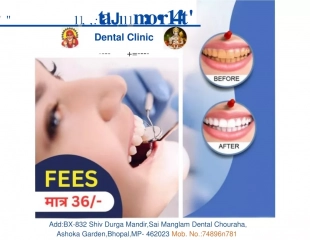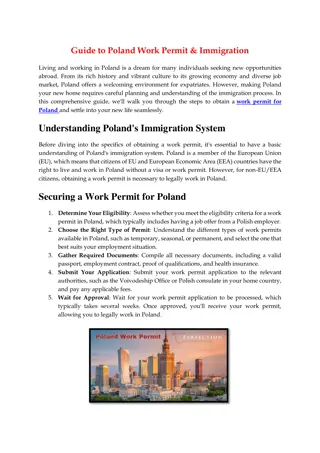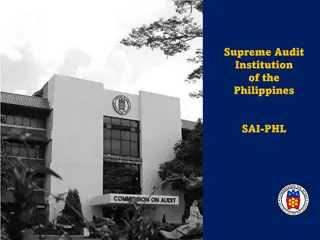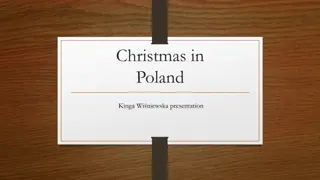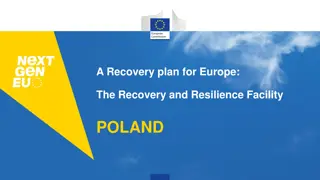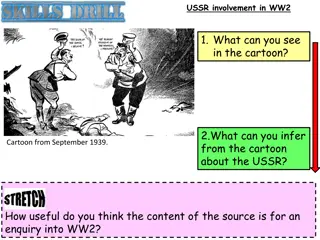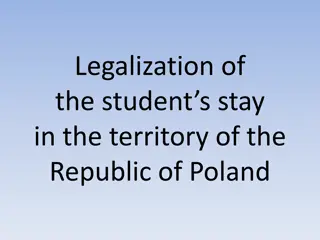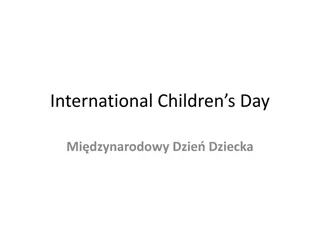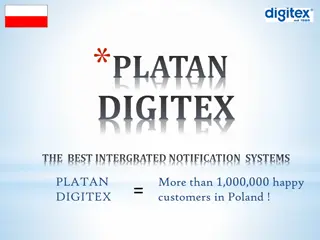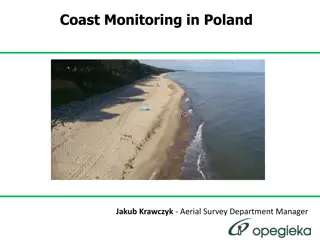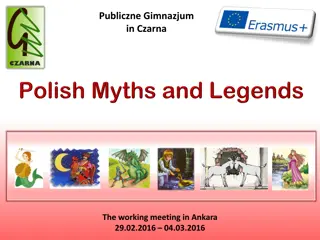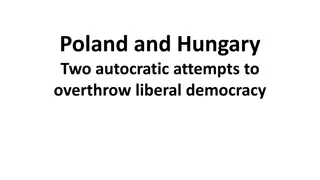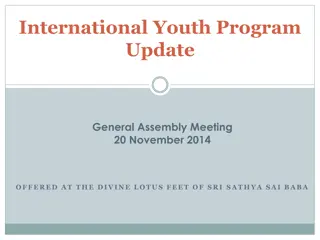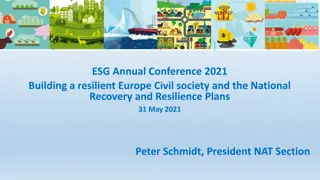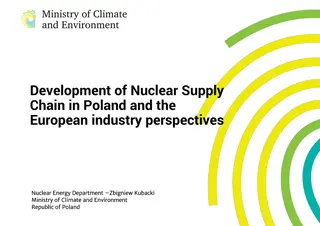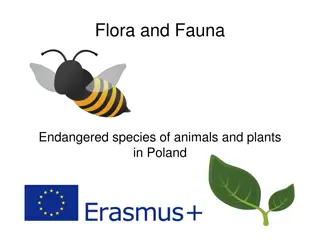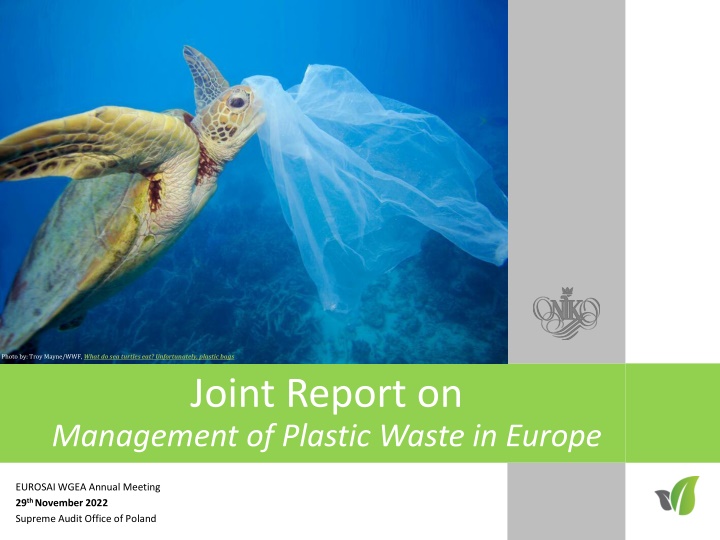
Sea Turtles and Plastic Waste: Joint Audit Report Highlights
Explore the Joint Report on Management of Plastic Waste in Europe, emphasizing the unfortunate consumption of plastic bags by sea turtles. The report outlines the audit process, participant countries, and key findings. Discover how policies and measures are addressed to combat plastic waste generation and management.
Download Presentation

Please find below an Image/Link to download the presentation.
The content on the website is provided AS IS for your information and personal use only. It may not be sold, licensed, or shared on other websites without obtaining consent from the author. If you encounter any issues during the download, it is possible that the publisher has removed the file from their server.
You are allowed to download the files provided on this website for personal or commercial use, subject to the condition that they are used lawfully. All files are the property of their respective owners.
The content on the website is provided AS IS for your information and personal use only. It may not be sold, licensed, or shared on other websites without obtaining consent from the author.
E N D
Presentation Transcript
Photo by: Troy Mayne/WWF, What do sea turtles eat? Unfortunately, plastic bags Joint Report on Management of Plastic Waste in Europe EUROSAI WGEA Annual Meeting 29th November 2022 Supreme Audit Office of Poland
01 Timetable [May 2019, WGEA Spring Session] discussion on the general scope and time planning of the cooperativeauditamongpotentialparticipatingSAIs, [May-September 2019] sharing ideas about possible scope of the coordinated audit and its organization, [October2019] preliminarydeclarationofparticipationinthecooperativeaudit. [December2019,Kick-offMeetinginKrakow] startoftheaudit: preparationanauditframeworkforacoordinatedauditonManagementofPlasticWasteinEurope, 12SAIsdecidedtojointhecoordinatedaudit, theSupremeAuditOfficeofPoland(NIK)tookoverthedutiesofacoordinatoroftheproject, [2ndhalf of 2020] agreement and signing of a bilateral Memorandum of Understanding between NIKandindividualparticipants, [2020-2021] performing of the parallel (national) audits, sharing information and monitoring audit progress,includingorganizationofthree(online)meeting: Meeting1(28January2021) presentationsanddiscussiononauditaspectNo1, Meeting2(25March2021) presentationsanddiscussiononauditaspectNo2, Meeting3(20May2021) presentationsanddiscussiononauditaspectNo3. Preparation phase Implementation [2021] exchangeoftheauditresultstoprovidethebasisoftheJointReport, [September2021-February2022] preparationofadraftoftheJointReport, [March-April 2022] compliance check with the national audit results and finalization of work onthepreparationoftheJointReportforpublication, [9May2022] ClosingMeeting, [May2022] publicationoftheJointReport. E U R O S A I Reporting W G E A www.nik.gov.pl
02 Participants and Audit Framework 12 participants have decided to join the coordinated audit on Management of Plastic Waste in Europe (SAIs in following countries: Republic of Albania, Republic of Bulgaria, Hungary, Republic of Malta, Republic of Moldova, Republic of North Macedonia, Republic of Poland, Portuguese Republic, Romania, Republic of Serbia, Slovak Republic andRepublicofTurkey) Participants prepared a common audit framework (Appendix Two to the Joint Report) containing the main audit question, ofsub-questionstobeaddressedbythenationalaudits. The main audit question was: Have the relevant public authorities developed policies and implemented measures aimed at achieving goals (adopted in in such policies) regardinggenerationandmanagementofplasticwaste? TheReportisbasedon: documents received from audit participants, i.e. summaries of national audits (AppendixSeventotheReport),tablesandpresentationsonindividualauditaspects, externalmaterials(AppendixTentotheReport) Eurostatwastedatabases. In majority of cases, period of time covered by the coordinated audit was 2017-2019. three audit aspects and a number E U R O S A I W G E A www.nik.gov.pl
03 Participants in the coordinated audit on plastic waste E U R O S A I W G E A www.nik.gov.pl
04 Joint Report Content TheJoint Reportcontains: SUMMARY of the most important findings, including: MainProbleminTermsofPlasticWastePollution, Audit Scope and Approach, KeyFindingsandJointConclusions (21 points), Joint Recommendations (11 points), a brief INTRODUCTION to plastic waste pollution, MAINFINDINGSinthreeareas: 1.LegislationandOrganizationalArrangementsConcerningPlasticWasteManagement. 2.AppliedPoliciesinOrdertoImplementProperPlasticWasteManagement. 3.ResultsofImplementedPlasticWasteTreatmentMeasures. ten APPENDICES, i.a.: Audit Framework (Appendix Two), SummariesofNationalAuditsonPlasticWaste (AppendixSeven), References EvidenceBase(AppendixTen). E U R O S A I W G E A www.nik.gov.pl
05 Audit Aspect No 1 Legislation and Organizational Arrangements Concerning Plastic Waste Management (1) The first audit aspect presented the most important legal regulations and organizational arrangements concerning plastic waste treatment, adopted in the countries covered by the coordinated audit on plastic waste. It is intended to present differences and similaritiesonsuchtopicsas: applicationofthewastehierarchyprinciple, adoptionofplansandprogrammesonwastemanagement, separatecollectionofwasteandtargetsset, extendedproducerresponsibility, divisionoftasksinnationalwastemanagementsystems, eco-designofplasticpackaging, Single-UsePlasticsand otherimportantandparticularfindings. Wastemanagementsystemsinthecountriescoveredbytheauditvarywidely. 11SAIsexpressedrathercriticalopinionsontheirnationalwastemanagementsystems. Some of the participants indicated that their legal frameworks were not fully compliant withEUlegislation. E U R O S A I W G E A www.nik.gov.pl
06 Audit Aspect No 1 Legislation and Organizational Arrangements Concerning Plastic Waste Management (2) All countries covered by the coordinated audit incorporated the waste hierarchy into their national legal frameworks, but 4 SAIs admitted that the waste hierarchy was not properlyimplemented. 11countrieshaveadoptedseparatewastecollection,but5auditparticipantsmentioned problemswithitsorganizationorinsufficienteffectiveness. 11 countries have also adopted EPR schemes in national legislation, but problems withoperationofsuchschemeshavebeenidentifiedin9countries. No country has implemented binding standards for the eco-design of plastic packaging and only 5 countries have references to the eco-design in legislative and policy documents. No country has implemented a Deposit-Return Scheme, and 6 were in the process ofsuchimplementation. E U R O S A I W G E A www.nik.gov.pl
07 Audit Aspect No 2 Applied Policies in Order to Implement Proper Plastic Waste Management (1) The second chapter was dedicated to a presentation of policies applied in the countries covered by the coordinated audit on plastic waste. In this regard this chapter discusses: measures aimed at the proper management of plastic waste, adopted and implemented, problem analysis on plastic waste treatment, the EPR schemes, educational andinformativeactivities,good practices andother importantissues related toplasticwastemanagement. 10SAIsassessedtheadoptedpoliciesincriticalterms. Theadoptedmeasureswereimplementedonlypartially. 10 countries covered by the coordinated audit have not mentioned in their strategic documents separate targets for plastic waste in addition to the (target) recycling rates forplasticpackagingwaste. The countries have to deal with problems concerning plastic waste management E U R O S A I W G E A of various scale and diversity, ranging from the most fundamental ones, such as lack of proper infrastructure for separate collection of municipal waste to shortcomings intheoperationofEPRschemes. www.nik.gov.pl
08 Audit Aspect No 2 Applied Policies in Order to Implement Proper Plastic Waste Management (2) Seven out of twelve SAIs participating in the coordinated audit gathered data on nationwide payments of fees implemented under the EPR schemes for plastic products. Thesewere:Bulgaria,Malta,Poland,Portugal,Romania,SerbiaandTurkey. Every SAI participating in the coordinated audit found that educational andinformativeactivitiesonproperwastemanagementwereperformed. In general, the auditors concluded that the measures taken by relevant authorities were insufficienttoreduceplasticwastegenerationanditspropertreatment. E U R O S A I W G E A www.nik.gov.pl
09 Audit Aspect No 2 Applied Policies in Order to Implement Proper Plastic Waste Management (3) Albania Bulgaria Separatecollectionofmunicipalwaste buildingproperinfrastructure. 1.Closing municipal waste landfills that do not meet European requirements. 2.Separate collection of municipalwaste(buildingproperinfrastructure). 3.EPR(fees) Separatecollectionandutilisationofplasticpackagingwaste(settingaquantitativetarget). 1.Waste prevention. 2.Collection reforms. 3.Waste treatment options. 4.Infrastructure 5.EPR (fees). 6.Enforcement. 7.Education. 8.Waste streams. 9.Ban on importation, production and sale of certainSUP Moldova Separatecollection, performedbyamunicipalenterprise,whichcollectsabout50%ofthetotalamountof municipalwasteinthecountry. N.Macedonia Separatecollectionofmunicipalwaste. Poland 1.Separate collection of municipal waste, including establishing of relevant infrastructure. 2.Ordering a surveyonmorphologyofmunicipalwaste. 3.Establishingnetworksofrepairandreuse. 4.Establishing localplatformsforwasteprevention. 5.EPR(fees) Portugal 1.Separatecollectionofplasticpackaging. 2.EPR(fees). Romania 1.Banonlightweight,verylightweightplasticcarrierbagswithhandle. 2.EPR(fees). Serbia 1.Separatecollectionofmunicipalwaste. 2.EPR(fees) Slovakia 1.Separate collection 2.Restriction to landfill sorted plastic waste 3.Ban on the charge free use of plastic bags 4.EPR(fees). Turkey 1.Separatecollectionofpackagingwaste. 2.EPR(fees). Hungary Malta E U R O S A I W G E A www.nik.gov.pl
10 Audit Aspect No 3 Results of Implemented Plastic Waste Treatment Measures Notallcountriesdeveloped/implementedWastePreventionProgrammes(thisappliesto 4countries),andavastmajorityofthem(10)failedtoreducethequantitiesofmunicipal waste generated in 2016-2019, while one pillar of Circular Economy is waste hierarchy whichdefinesPREVENTIONasitstopitem. 11 SAIs indicated that municipal waste/plastic municipal waste was treated in less desirablewayinthecontextofwastehierarchy. 9 SAIs pointed out that the data reporting system was not working properly/did not provide adequate data for the assessment of plastic waste management. 8 SAIs stated that monitoring/supervision by public inplasticwastemanagementwasinsufficient. 7 SAIs noticed that conditions (including legal framework, organisational arrangements, implementedmeasures)fortransitiontotheCircularEconomymodelwereinsufficient. Comparison of potential amount of the quantitative levy on non-recycled plastic packagingwaste,effectiveintheEUfrom2021,withpaymentsonplasticproductsunder EPR schemes in operation shows that for 7 countries covered by the coordinated audit for which comparative data were collected, the conclusion cannot be that they conductedeffectivetreatmentofplasticpackagingwaste. authorities of the results achieved E U R O S A I W G E A www.nik.gov.pl
11 Audit Aspect No 3 Results of Implemented Plastic Waste Treatment Measures Notallcountriesdeveloped/implementedWastePreventionProgrammes(thisappliesto 4countries),andavastmajorityofthem(10)failedtoreducethequantitiesofmunicipal waste generated in 2016-2019, while one pillar of Circular Economy is waste hierarchy whichdefinesPREVENTIONasitstopitem. 11 SAIs indicated that municipal waste/plastic municipal waste was treated in less desirablewayinthecontextofwastehierarchy. 9 SAIs pointed out that the data reporting system was not working properly/did not provideadequatedatafortheassessmentofplasticwastemanagement. 8 SAIs stated that monitoring/supervision by public authorities of the results achieved inplasticwastemanagementwasinsufficient. 7 SAIs noticed that conditions (including legal framework, organisational arrangements, implementedmeasures)fortransitiontotheCircularEconomymodelwereinsufficient. Comparison of potential amount of the quantitative levy on non-recycled plastic packagingwaste,effectiveintheEUfrom2021,withpaymentsonplasticproductsunder EPR schemes in operation shows that for 7 countries covered by the coordinated audit for which comparative data were collected, the conclusion cannot be that they conductedeffectivetreatmentofplasticpackagingwaste. E U R O S A I W G E A www.nik.gov.pl
12 Joint Recommendations (1) The findings of this coordinated audit show that, for the time being, Circular Economy is more prominent as theoretical concept rather than practical action taken by inparticularcountriescoveredbytheaudit. Substantial change is be needed in the waste management system to fully embrace the CircularEconomymodel. The Joint Report contains 11 RECOMMENDATIONS to improve plastic waste management concerninginparticular: 1) eco-design of plastic packaging - review the opportunities to put in place solutions to ensurebetterplasticproductrecyclingcapacity,inparticularadoptbindingstandards, 2) EPR schemes - make efforts to establish EPR schemes or improve the existing solutions in this regard, including by more adequate coverage of the costs of plastic packaging waste managementbymanufacturers, 3) Deposit-Return Scheme for packaging - make efforts to perform a feasibility study for E U R O S A I establishing a DRS for packaging, including for plastic packaging in countries which have W G E A nottakenmeasuresinthisregardsofar, 4) separate collection of waste - implement solutions to ensure better organised or more effectiveseparatecollection,especiallyforthestreamofmunicipalwaste, www.nik.gov.pl
13 Joint Recommendations (2) 5) data reporting systems - implement solutions to ensure better operation of waste datareporting systems,so that theycan beused for effective and correct shaping of policies and preparation of waste management programmes, and for the assessmentoftheoutcomesoftheimplementedmeasures, 6) recycling rate of municipal waste calculation methodology - aim at standardisation, inparticularinEUcountries,butalsowiderintheEuropeancontinent, 7) monitortheoutcomes - intensifyefforts, 8) management of municipal waste - improve the effectiveness, in particular by more emphasis on measures to prevent generation of waste, and then measures leading to the treating of the generated waste in processes being the top priority in the wastehierarchyadoptedintheCircularEconomymodel 9) transboundary movements of waste adopt more stringent rules and stricter controlsofplasticwasteimportedtoandexportedfromagivencountry, 10) management of plastic packaging waste intensify measures, especially in the context of more stringent future targets in this regard for EU countries, and inadequate payments within EPR schemes in the context of the contribution placed onnon-recycledplasticpackagingwasteeffectivefrom2021, 11) educationalandinformativemeasures - intensifytheactivityofpublicactors. E U R O S A I W G E A www.nik.gov.pl


